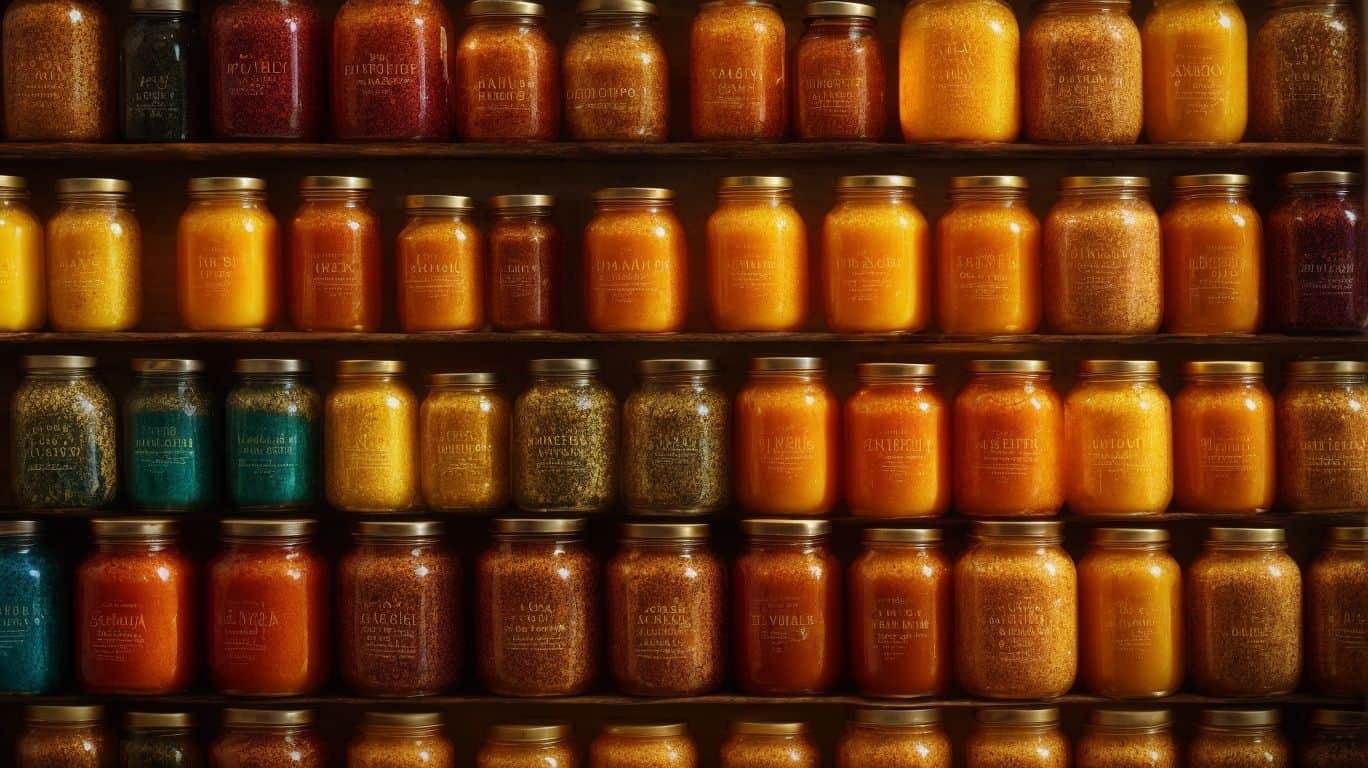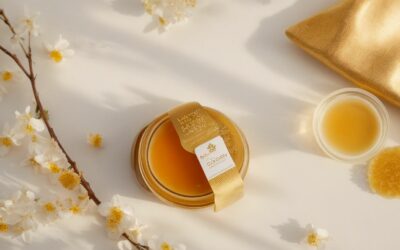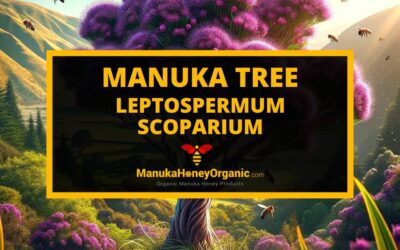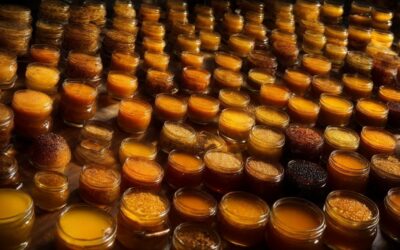Welcome to the world of delicious and nutritious New Zealand honey varieties. Have you ever found yourself overwhelmed by the numerous types of honey available in the market and unsure which one to choose?
Don’t worry, this comprehensive guide is here to help you discover the unique taste and benefits of New Zealand’s finest honey. Indulge yourself in the sweet journey of exploring these golden jars of goodness.
What Is New Zealand Honey?
What Is New Zealand Honey? New Zealand honey is a highly valued and exceptional product known for its exceptional taste and superior quality. One of the factors that sets it apart is the wide variety of flora found in the country, including native trees such as Manuka tree and Kamahi.
These plants contribute to the distinctive flavors and characteristics of the honey.
In addition to its delicious taste, New Zealand honey is also renowned for its antibacterial properties, making it a highly sought-after product for its potential health benefits.
With its abundance of diverse floral sources, New Zealand honey is a natural and delectable option for sweetening.
How Is New Zealand Honey Produced?
New Zealand honey production involves a series of carefully executed steps, ensuring high quality and purity. Here is a concise list of the process:
- Beekeeping: Beekeepers maintain hives that house honeybees.
- Flower foraging: Bees collect nectar from various flowers, including manuka, clover, and rewarewa.
- Nectar collection: Bees convert nectar into honey in their honey stomachs through enzymatic processes.
- Honey extraction: Beekeepers remove frames from hives and extract honey using specialized equipment.
- Filtering: The extracted honey undergoes filtration to remove impurities like beeswax and pollen.
- Jar filling: The filtered honey is carefully poured into jars for packaging.
- Quality control: The honey is tested for purity, moisture content, and other quality parameters.
These steps ensure the production of premium New Zealand honey, renowned for its unique flavors and health benefits.
What Are The Different Varieties Of New Zealand Honey?
New Zealand is renowned for its diverse and high-quality honey varieties, each with its own unique flavor profile and health benefits. In this section, we will take a closer look at the different types of honey produced in New Zealand.
From the highly sought-after Manuka honey to the lesser-known Thyme honey, we will explore the distinctive characteristics and uses of each variety. Get ready to discover the fascinating world of New Zealand honey.
1. Manuka Honey
Manuka honey is a highly sought-after and unique variety of honey from New Zealand. To ensure you choose the right Manuka honey, follow these steps:
- Check the label for UMF or MGO ratings, which indicate the level of unique Manuka factor and methylglyoxal. These ratings determine the potency and quality of the honey.
- Verify the brand’s authenticity and quality certifications, such as the Unique Manuka Factor Honey Association (UMFHA) or Manuka Honey Science Definition (MHS).
- Consider the source and processing method. Look for honey sourced from remote areas with minimal human activity and processed in a way that preserves its natural properties.
- Take into account your taste and aroma preferences. Manuka honey can have a strong, distinctive taste and aroma, so choose a variant that suits your palate.
- Consider your personal health needs and goals. Manuka honey is known for its antibacterial and health-boosting properties, so think about how it can support your specific health requirements.
By following these steps, you can confidently choose the right Manuka honey that meets your standards for quality, taste, and health benefits.
2. Kanuka Honey
Kanuka honey is a unique variety of honey from New Zealand that stands out from other types. It is made by bees that gather nectar from the native Kanuka tree, giving it a distinct and flavorful taste with hints of herbs and spices.
This type of honey is well-known for its antibacterial properties, making it a great choice for treating skin conditions and promoting wound healing.
When shopping for Kanuka honey, make sure to choose authentic products with high UMF or MGO ratings to ensure its quality and effectiveness. Consider your personal taste preferences, health needs, and goals to find the perfect Kanuka honey for you.
3. Rewarewa Honey
Rewarewa honey is one of the many varieties of New Zealand honey. It is produced from the nectar of the rewarewa tree, a native tree species known for its vibrant red flowers.
This particular type of honey, known as Rewarewa honey, has a dark amber color and a unique flavor profile that is described as rich and malty with hints of caramel. It is highly sought after for its high antioxidant content and potential health benefits.
When selecting Rewarewa honey, it is important to consider factors such as:
- The UMF or MGO ratings
- Authenticity and quality certifications
- Source and processing method
- Personal taste and health needs
4. Tawari Honey
Tawari honey is a unique variety of honey from New Zealand, known for its smooth texture and delicate taste. Made from the nectar of the Tawari tree, this honey has a light golden color and a subtle floral scent.
It is highly regarded for its antioxidant properties and is believed to have many health benefits, including soothing sore throats and aiding digestion. When selecting Tawari honey, be sure to choose authentic brands with quality certifications such as UMF or MGO ratings.
Consider your personal taste preferences and health goals to find the perfect Tawari honey for you.
A friend of mine had a persistent cough, and after researching natural remedies, she decided to try Tawari honey.
She found that the honey effectively soothed her throat and relieved her cough without any negative side effects. She became a fan of Tawari honey and now incorporates it into her daily routine for its potential health benefits.
5. Kamahi Honey
Kamahi honey, a popular variety of New Zealand honey, is known for its unique flavor and numerous health benefits. When choosing Kamahi honey, keep the following in mind:
- Look for a reputable brand that offers Kamahi honey.
- Check for certifications such as UMF or MGO ratings, which ensure the authenticity and quality of the honey.
- Consider the source and processing method. Look for honey that is sourced from sustainable beekeeping practices.
- Take into account your taste and aroma preferences when selecting Kamahi honey. This type of honey has a rich, caramel-like taste with floral undertones.
- Lastly, consider your personal health needs and goals. Kamahi honey is known for its antibacterial properties and can help soothe sore throats and coughs.
Fun Fact: Kamahi honey is primarily produced in the South Island of New Zealand.
6. Rata Honey
Rata honey, derived from the crimson flowers of the rata tree, is a unique variety of New Zealand honey that offers several health benefits. Here are steps to choose the right rata honey:
- Look for UMF or MGO ratings to ensure the purity and quality of the honey.
- Check for authenticity and quality certifications, such as the Unique Manuka Factor (UMF) certification.
- Consider the source and processing method, ensuring it comes from reputable beekeepers and undergoes minimal processing.
- Taste and aroma preferences play a crucial role, so choose rata honey with flavors that appeal to you.
- Lastly, consider your personal health needs and goals to select the best variety of rata honey that aligns with your objectives.
Pro-tip: Rata honey pairs wonderfully with warm beverages like tea or as a natural sweetener for desserts. Enjoy its distinct flavor and health benefits!
7. Clover Honey
Clover honey is a popular variety of honey in New Zealand known for its mild and sweet flavor. When selecting the perfect clover honey, follow these steps:
- Choose reputable brands that source their clover honey from New Zealand.
- Check for certifications such as UMF or MGO ratings to ensure quality and authenticity.
- Consider the processing method – raw or organic clover honey preserves more nutrients.
- Take into account your taste preferences – some clover honeys may have a lighter or stronger flavor.
- Consider your personal health needs and goals – whether you want to boost your immune system or soothe a sore throat, choose a clover honey with those specific benefits.
For a delightful addition to your tea or toast, try some of New Zealand’s finest clover honey brands, such as Airborne, Manuka Health, or Happy Valley. Enjoy the natural sweetness and health benefits of clover honey!
8. Thyme Honey
Thyme honey is a special type of honey found in New Zealand that has a unique flavor and aroma. It is created by bees that primarily gather nectar from thyme flowers, resulting in a deliciously herbal taste.
Thyme honey is renowned for its antibacterial and antimicrobial properties, making it a popular option for boosting the immune system and soothing sore throats.
When selecting thyme honey, be sure to choose authentic products with quality certifications and consider your personal taste preferences. Incorporating thyme honey into your diet can add a flavorful and beneficial element to your meals and wellness routine.
9. Beech Honeydew Honey
Beech Honeydew Honey is an exceptional type of honey that can be found in New Zealand. It is created by bees that gather honeydew from scale insects on beech trees.
This honey has a deep color, flavorful taste, and a hint of bitterness. Beech Honeydew Honey is renowned for its abundance of antioxidants and potential positive effects on health.
When deciding on this honey, take into account factors such as:
- UMF or MGO ratings
- certifications for authenticity and quality
- the source and method of processing
- personal taste preferences and health objectives
What Are The Health Benefits Of New Zealand Honey?
New Zealand is known for its vast and diverse array of honey varieties, each with its unique flavor and texture. But beyond its delicious taste, New Zealand honey is also renowned for its numerous health benefits.
In this section, we will delve into the specific health benefits of New Zealand honey, including its antibacterial and antimicrobial properties, high antioxidant content, soothing effects on sore throats and coughs, aid in digestion, boosting of the immune system, and potential for aiding in wound healing.
Let’s explore the wonders of New Zealand honey and its potential impact on our well-being.
1. Antibacterial and Antimicrobial Properties
Antibacterial and antimicrobial properties are essential considerations when choosing honey from New Zealand. To ensure that you select honey with these beneficial properties, follow the steps below:
- Check for honey with a UMF or MGO rating, as these indicate the presence of antibacterial compounds.
- Look for certifications of authenticity and quality, such as the Unique Manuka Factor (UMF) certification.
- Consider the source and processing method of the honey, as these can affect its antibacterial properties.
- Take into account your personal taste and aroma preferences, as not all honey varieties have the same flavor profile.
- Consider your individual health needs and goals, as certain types of honey may offer additional health benefits beyond their antibacterial properties.
In history, the indigenous Maori people of New Zealand have long recognized and valued the antibacterial properties of Manuka honey, using it to treat wounds and infections.
2. Rich in Antioxidants
New Zealand honey is widely known for its abundance of antioxidants, which play a vital role in safeguarding the body against harmful free radicals. These powerful antioxidants, such as polyphenols and flavonoids, aid in fighting oxidative stress and inflammation, promoting overall health and well-being.
Extensive research has shown that New Zealand honey, including popular varieties like Manuka honey, contains higher levels of antioxidants compared to other types of honey.
By incorporating New Zealand honey into your diet, you can reap numerous benefits, including improved immune function, enhanced skin health, and a reduced risk of chronic diseases.
Make the wise choice of selecting New Zealand honey for its exceptional antioxidant content to support your health goals.
3. Soothes Sore Throats and Coughs
New Zealand honey, specifically Manuka honey, is renowned for its ability to soothe sore throats and coughs. To reap these benefits, follow these steps:
- Take a teaspoon of Manuka honey and let it slowly dissolve in your mouth.
- Alternatively, mix the honey with warm water or herbal tea.
- For added benefits, consider adding a squeeze of lemon juice or ginger to the mixture.
- Drink this concoction multiple times a day to experience relief.
Remember to choose a high-quality Manuka honey with a UMF or MGO rating to ensure its effectiveness. Additionally, consult with a healthcare professional if symptoms persist or worsen.
4. Aids in Digestion
New Zealand honey has been found to be beneficial for digestion due to its natural enzymes and prebiotics that support a healthy gut.
These enzymes help break down food, making it easier to digest, while the prebiotics promote the growth of beneficial bacteria in the gut.
Certain types of New Zealand honey, such as Manuka honey, also have antibacterial properties that can aid in digestive issues caused by bacteria.
When selecting a New Zealand honey for its digestive benefits, look for high UMF or MGO ratings, as they indicate higher levels of enzymes and other beneficial compounds.
A pro tip is to consume a teaspoon of New Zealand honey before meals to enhance digestion.
5. Boosts Immune System
To boost your immune system with New Zealand honey, follow these steps:
- Choose honey with high levels of antioxidants, such as Manuka or Rewarewa honey.
- Consume honey regularly by incorporating it into your daily routine, such as adding it to your tea, smoothies, or as a natural sweetener.
- Pair honey with other immune-boosting foods like citrus fruits, ginger, or turmeric.
- For an extra immune kick, consider starting your morning with honey and warm water with lemon.
- If you have any specific health concerns or conditions, be sure to consult with a healthcare professional.
Fact: New Zealand honey, particularly Manuka honey, is known for its potent antibacterial properties, making it a powerful ally in boosting the immune system.
6. May Help with Wound Healing
Using New Zealand honey for wound healing can potentially aid in the healing process due to its unique properties. To incorporate it, follow these steps:
- Ensure that the wound is thoroughly cleaned and free from any debris.
- Apply a thin layer of New Zealand honey directly onto the wound.
- Cover the wound with a sterile dressing or bandage.
- Regularly change the dressing, typically every 24 to 48 hours.
- Monitor the wound for any signs of infection or slow healing.
- Continue using New Zealand honey until the wound has fully healed or as directed by a healthcare professional.
How To Choose The Right New Zealand Honey?
With the wide variety of honey produced in New Zealand, choosing the right one can be overwhelming. To help you make the best choice, let’s break down the factors to consider.
From checking for quality certifications to understanding the different processing methods, we’ll cover everything you need to know.
We’ll also explore how your personal taste preferences and health goals can influence your decision. So, let’s dive into the ultimate guide for choosing the perfect New Zealand honey for you.
1. Look for UMF or MGO Ratings
To ensure the authenticity and quality of New Zealand honey, consider the following steps:
- Look for UMF or MGO ratings on the label, which indicate the level of unique Manuka properties in the honey.
- Higher UMF or MGO ratings signify higher quality and stronger medicinal properties.
- UMF ratings should be at least 10+ for general health benefits, while 15+ or higher is recommended for therapeutic use.
- Check for certification from the Unique Manuka Factor Honey Association to guarantee the honey’s authenticity.
- Verify the source of the honey, ensuring it is sourced from New Zealand and processed using sustainable practices.
Fact: New Zealand Manuka honey with higher UMF or MGO ratings has been scientifically proven to have potent antibacterial and antimicrobial properties.
2. Check for Authenticity and Quality Certifications
To ensure the authenticity and quality of New Zealand honey, follow these steps:
- Look for certifications: Check if the honey has the Unique Manuka Factor (UMF) or Methylglyoxal (MGO) rating, which guarantee the honey’s authenticity.
- Verify the source: Ensure the honey is sourced from trusted New Zealand beekeepers who follow strict quality control measures.
- Check for the required certifications: Look for the New Zealand Food Safety Authority (NZFSA) or the Ministry for Primary Industries (MPI) certifications, which ensure the honey meets rigorous quality standards.
- Inspect the packaging: Authentic New Zealand honey will have clear labeling with the UMF or MGO rating and information about its origin.
- Read reviews: Research and read reviews from reputable sources or other buyers to assess the authenticity and quality of the honey.
3. Consider the Source and Processing Method
When choosing New Zealand honey, it is important to consider the source and processing method to ensure its quality and authenticity.
- Source: Look for honey that is sourced from reputable beekeepers or companies known for their ethical and sustainable practices.
- Processing Method: Opt for honey that is minimally processed to retain its natural enzymes and health benefits. Cold extraction methods are preferred over heat processing.
- Purity: Check if the honey is pure and free from additives, such as sugars or artificial flavors.
- Quality Certifications: Look for honey that is certified by recognized organizations like UMF or MGO, which verify its authenticity and quality.
- Traceability: Consider honey that provides information about the specific region or area where it was harvested, ensuring transparency and accountability.
- New Zealand honey has a rich tradition dating back centuries, where Māori communities have been cultivating and harvesting honey from native flora. The traditional methods of beekeeping have been passed down through generations, ensuring a deep connection to the land and a commitment to sustainable practices.
4. Taste and Aroma Preferences
When selecting New Zealand honey, it is important to take into account personal taste and aroma preferences. Here are some factors to keep in mind:
- Floral Notes: Some varieties, such as Kamahi honey, offer a delicate floral taste, while Rewarewa honey boasts a stronger, caramel-like flavor.
- Intensity: Manuka honey is known for its distinctive strong taste, while Clover honey provides a milder, sweeter flavor.
- Aroma: Thyme honey has a pleasant herbal scent, while Rata honey has a unique, slightly woody aroma.
- Pairing: Consider the intended use of the honey – whether it will be spread on toast, added to tea, or used in recipes.
- Experiment: Don’t be afraid to try different varieties in order to find your preferred taste and aroma profiles.
Fun fact: Did you know that New Zealand honey is renowned for its exceptional quality, thanks to the country’s pristine environment and strict production standards?
5. Personal Health Needs and Goals
When selecting the perfect New Zealand honey for your personal health needs and goals, it is important to follow these steps:
- Identify your specific health needs and goals, such as immune system support or wound healing.
- Research the health benefits of different New Zealand honey varieties, such as Manuka honey for its antibacterial properties or Thyme honey for soothing sore throats.
- Check the UMF or MGO ratings to ensure the potency and effectiveness of the honey.
- Verify the authenticity and quality certifications to ensure that you are purchasing genuine New Zealand honey.
- Consider the source and processing method to ensure that the honey is of high quality and has not been adulterated.
- Take into account your preferences for taste and aroma, as different honey varieties have distinct flavors.
- Consult with a healthcare professional to determine the best honey variety and usage for your individual health needs and goals.
Choosing the ideal New Zealand honey is a personal journey that requires careful consideration of your specific health needs and goals. By following these steps, you can find the perfect honey to support your well-being.
Frequently Asked Questions
What is the Ultimate Guide to New Zealand Honey Varieties?
The Ultimate Guide to New Zealand Honey Varieties is a comprehensive resource that provides information on the various types of honey produced in New Zealand, including their unique characteristics, uses, and health benefits.
How many different types of honey are produced in New Zealand?
New Zealand is home to over 300 different types of honey, making it one of the most diverse honey producing countries in the world. Some of the most popular varieties include Manuka, Kanuka, Rewarewa, and Kamahi.
What makes New Zealand honey unique?
New Zealand honey is known for its high quality and unique flavors due to the country’s diverse landscape and climate. The bees feed on a variety of native plants, resulting in distinct and flavorful honey.
Is Manuka honey the only type of honey with health benefits?
No, while Manuka honey is well-known for its medicinal properties, many other types of New Zealand honey also offer health benefits. For example, Rewarewa honey is high in antioxidants and Kanuka honey has anti-inflammatory properties.
How can I use New Zealand honey?
New Zealand honey can be used in a variety of ways, including as a natural sweetener in food and drinks, as a skin and hair care ingredient, and for medicinal purposes. Each variety has its own unique uses and benefits.
Where can I find and purchase New Zealand honey?
New Zealand honey can be found in most local supermarkets and health food stores, as well as online. When purchasing honey, look for products that are labeled as 100% pure New Zealand honey to ensure you are getting an authentic product.
I’m a Manuka honey enthusiast and creator of Manuka Honey Organic, a blog where I share my journey with authentic Manuka honey from New Zealand. I want everyone to learn about the healing powers of Manuka honey.





